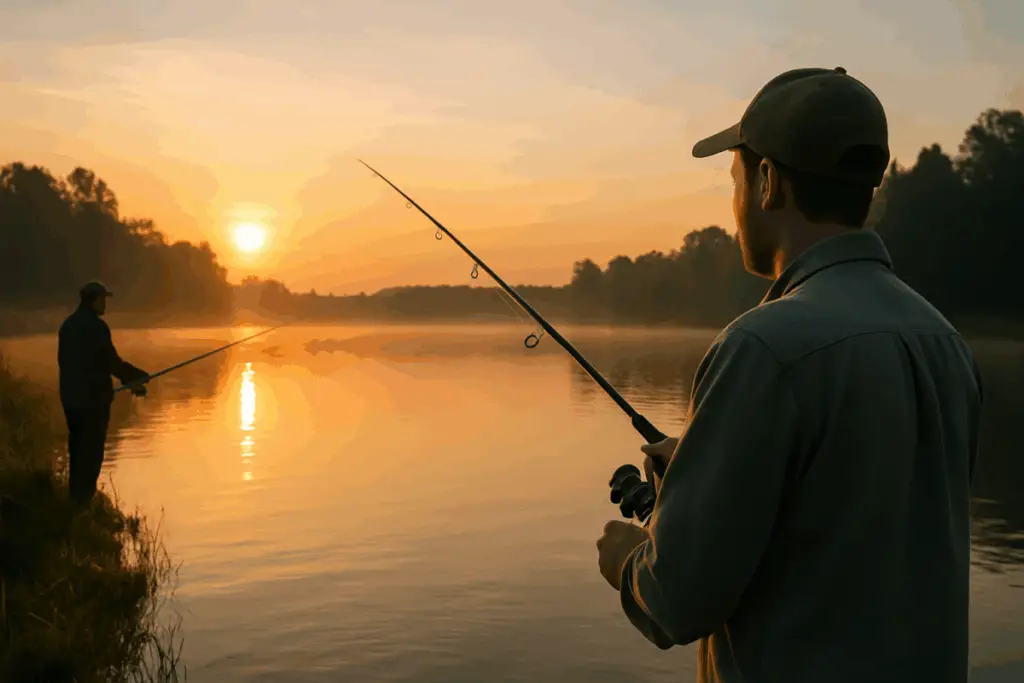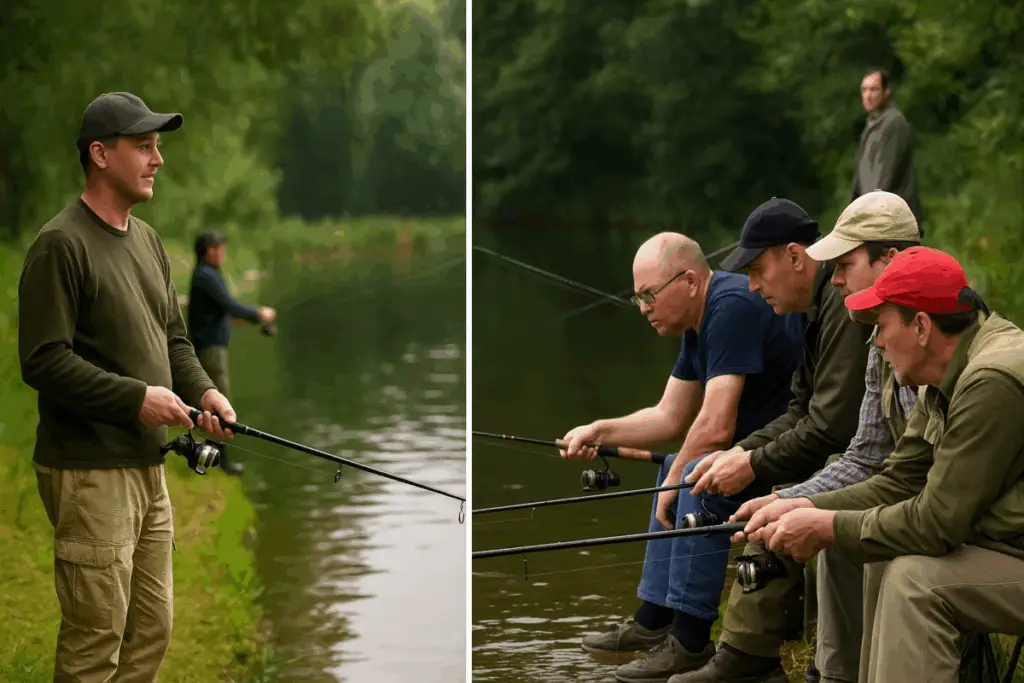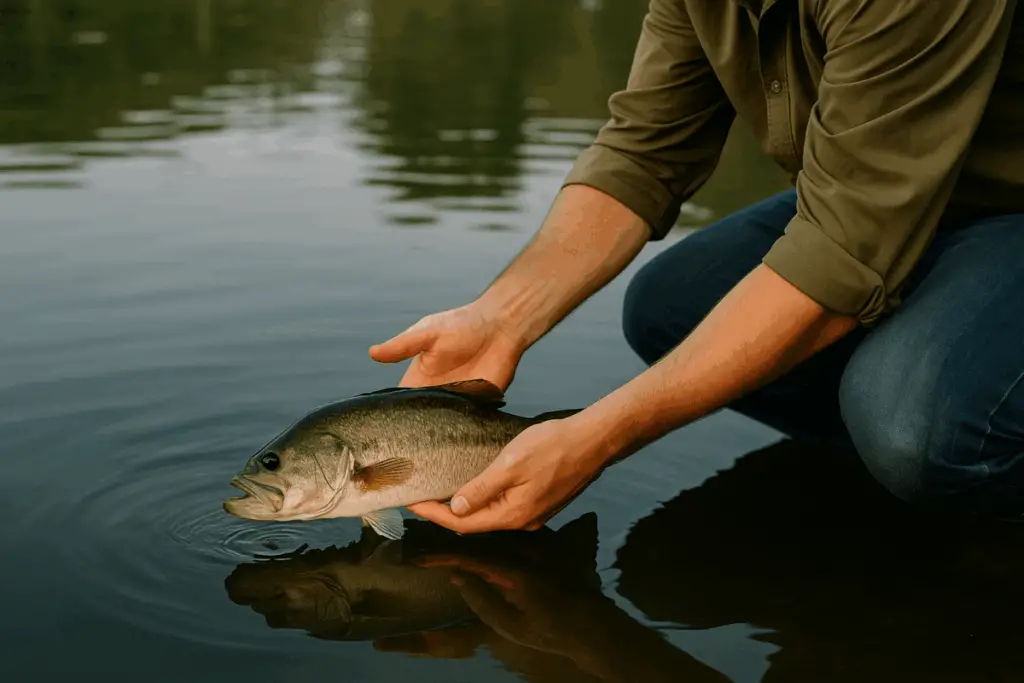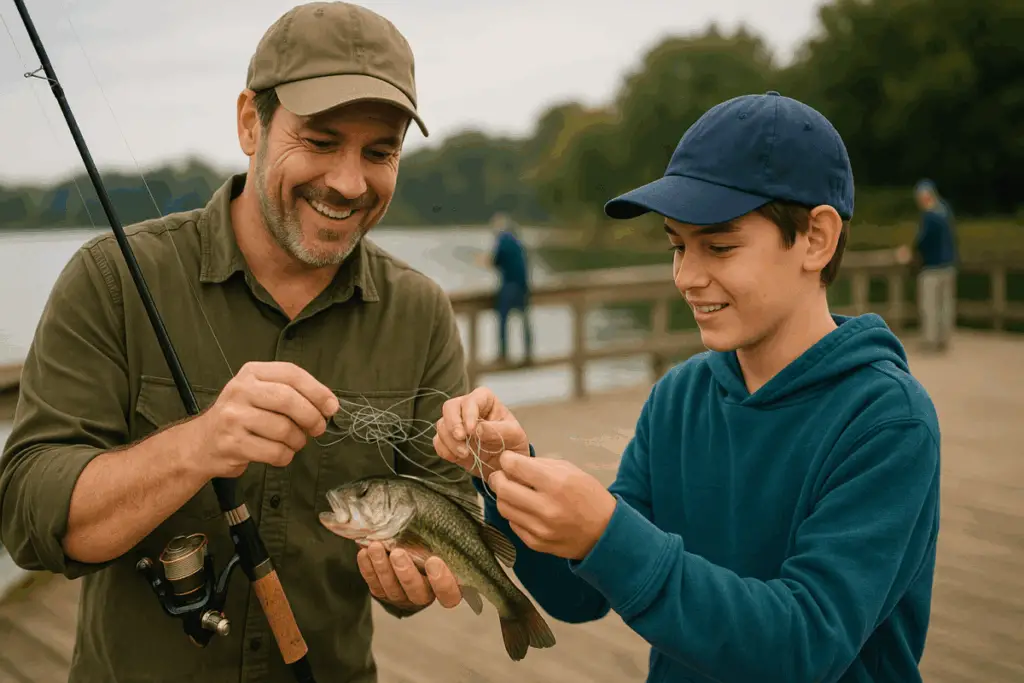
Fish Might Not Care About Manners—But Other Anglers Sure Do
If you’ve ever rolled up to a popular fishing hole and felt a few side-eyes from the locals, you’re not alone. Fishing isn’t just about casting a line—it’s about respecting the unspoken rules that keep the peace at busy freshwater spots.
It doesn’t matter if you’re new to the area or just trying out a new lake for the first time—understanding local fishing etiquette can mean the difference between a relaxing day and a few awkward encounters. These “rules” might not be posted on signs, but trust us, they matter.
Whether it’s giving folks space, using the right bait for the local fish, or simply leaving the bank cleaner than you found it, knowing how to fish like a local shows respect—not just for other anglers, but for the spot itself.
In this guide, we’ll walk you through:
- Common unspoken fishing rules you’ll want to know before you set up shop.
- How to blend in like a regular, even if it’s your first time fishing that water.
- Tips for handling tough situations (like accidentally crowding someone else’s spot) without ruining your trip.
Learning these little things not only helps you catch more fish—it helps you make more friends on the water too.
Fun Fact: According to Take Me Fishing, one of the top complaints among freshwater anglers isn’t about fish—it’s about people ignoring basic fishing etiquette like crowding and littering.
So grab your rod, pack some patience, and let’s talk about how to fish like you’ve been there your whole life.[IMAGE HERE]
Suggested image: A close-up of an angler smiling and giving a friendly wave to a neighboring fisherman across a small cove.
The Importance of Fishing Etiquette
It’s Not Just About Being Nice—It’s About Being Smart
When you step onto a popular dock, slip into a busy river, or paddle out onto a well-loved lake, you’re not just fishing—you’re sharing a resource. Fishing etiquette helps everyone have a better time, including you.
Ignoring unwritten fishing rules can lead to:
- Dirty looks (at best)
- Heated words (at worst)
- Lost fishing opportunities (because you unknowingly spooked the fish)
On the flip side, following proper etiquette makes it more likely you’ll be welcomed, get a few local tips, and maybe even get pointed toward the best bite.
According to Fishing Booker, respecting fishing etiquette is one of the fastest ways to be accepted by regulars—and one of the easiest ways to avoid conflict on the water.
Why Fishing Etiquette Matters
Here’s a quick breakdown of why these “unwritten rules” are so important—and what can happen if you don’t follow them:
| Reason | What Happens When You Respect It | What Happens When You Ignore It |
| Preserves Fishing Quality | Less pressure on fish; better bite for all | Spooked fish, frustrated anglers |
| Keeps the Peace | Friendly, cooperative atmosphere | Tension, arguments, or confrontation |
| Protects the Environment | Cleaner water and safer habitats | Pollution, habitat destruction |
| Builds Local Trust | Locals may share spots, tips, and help | Locals may shut you out or crowd you out |
| Enhances Safety | Fewer accidents with lines, hooks, boats | Increased risk of accidents and injuries |
Real-World Example: A Tale of Two Anglers
Imagine this:
- Angler A sets up 10 feet away from another fisher, crosses lines, and plays loud music.
- Angler B gives 50+ feet of space, asks quietly if the spot is free, and keeps noise to a minimum.
Who’s more likely to get a tip about the hidden rock pile where the bass are stacked up? Exactly.

Bottom Line: Etiquette = More Fish + Better Days
Good fishing etiquette isn’t just about avoiding conflict—it’s an advantage. Respect the people, the fish, and the water, and you’ll find the fishing community much more welcoming—and your trips far more rewarding.
Unwritten Rules at Popular Freshwater Fishing Spots
Some Rules Aren’t Posted—But Everyone Follows Them
Every popular freshwater fishing spot has its own “code”—a set of unwritten rules that anglers are expected to know and respect. Break them, and you’ll stand out in the worst way. Follow them, and you’ll fish like a local.
Here’s what you need to know:
Give Plenty of Space
Nothing sours the vibe faster than setting up too close to another angler. A good general rule: leave at least 50–100 feet between you and someone else if space allows.
In crowded bank spots or piers where room is tight, use common sense—ask politely if you’re unsure whether you’re crowding.
Tip: If you can cast across each other’s lines, you’re too close.
According to the Take Me Fishing organization, maintaining respectful distance is a core principle of good fishing etiquette, especially in public areas.
Respect “Local Lanes” and Common Casting Zones
At many popular rivers and lakes, certain casting lanes—like between rock piles or along weed edges—are unofficially claimed by whoever got there first.
- Don’t walk into someone’s casting line.
- Don’t drift your boat into a casting lane unless invited.
- If you’re boating past bank anglers, stay wide and slow.
Match the Local Bait and Style (If You Can)
At some lakes, throwing a loud topwater plug when everyone else is quietly finesse fishing can make you stand out—in a bad way.
- Notice what bait styles are common (live bait, worms, jigs, etc.).
- If unsure, start subtle and adapt as needed.
- Save the experimental stuff for quieter spots.
You don’t need to copy others exactly, but blending in a little shows respect for local rhythms and fish pressure.
Handle Fish Responsibly
Locals take pride in the health of “their” fishery. Mishandling fish—even accidentally—can get you some serious side-eye.
Best practices include:
- Use wet hands when handling fish to protect their slime coat.
- Keep fish in the water as much as possible if practicing catch and release.
- Use barbless hooks if local regulations recommend it.
The U.S. Fish and Wildlife Service recommends keeping fish wet and minimizing air exposure to improve survival rates after release.

Leave No Trace
One of the fastest ways to annoy local anglers (and harm the environment) is to leave trash behind.
Always pack out:
- Fishing line
- Bait containers
- Snack wrappers
- Water bottles
If you see trash—even if it’s not yours—picking it up shows you’re someone who cares about the fishery, not just using it. Many public waters are managed in part by local volunteers and organizations who notice when visitors help out.
Practicing Good Environmental Stewardship
Protect the Water, Protect the Future
When you fish a popular freshwater spot, you’re not just borrowing a space—you’re sharing an ecosystem that countless anglers, families, and wildlife depend on. Practicing good environmental stewardship isn’t just polite—it’s essential if you want these places to stay healthy, clean, and productive for years to come.
And honestly? It’s a major way to earn respect from locals without saying a word.
Easy Ways to Fish More Responsibly
You don’t have to overhaul your routine to make a positive impact. Small, consistent habits go a long way:
| Action | Why It Matters | Pro Tip |
| Pack Out Your Trash | Leftover line, wrappers, and bait jars harm wildlife | Keep a small trash bag in your tackle box |
| Use Biodegradable Gear | Reduces plastic pollution in waterways | Choose eco-friendly lines and non-lead weights |
| Respect Protected Areas | Gives fish critical spawning and recovery zones | Look for signs or ask local wildlife officers |
| Catch and Release Properly | Increases survival rates for released fish | Minimize handling and time out of water |
| Report Invasive Species | Helps stop spread and protect native fish populations | Know what to look for—report if you spot them |
According to the National Oceanic and Atmospheric Administration (NOAA), discarded fishing line and tackle are some of the biggest threats to fish, birds, and aquatic life due to entanglement and ingestion.
Be a Steward, Not Just a Visitor
Good stewardship makes you part of the fishing community, even if you’re new to the spot. Locals notice when someone quietly picks up trash, handles fish with care, or respects boundaries—and they often return that respect with helpful advice, friendly chats, and maybe even a few secret fishing tips.
If everyone pitches in just a little, our favorite lakes, rivers, and ponds stay incredible for generations of anglers to come.[IMAGE HERE]
Suggested image: A father and young daughter fishing together, smiling as they pick up a few pieces of trash before heading home.
How to Handle Awkward Situations Politely
Because Not Every Fishing Trip Goes Smoothly
Even if you’re doing everything right, awkward moments happen at busy fishing spots. Maybe you accidentally drift too close to someone. Maybe another angler crowds you. Knowing how to handle these situations calmly and politely can make all the difference.
The goal isn’t just to avoid conflict—it’s to keep the fishing atmosphere positive for everyone.
Common Awkward Situations (and How to Handle Them)
| Situation | What to Do | What Not to Do |
| You accidentally crowd another angler | Quickly apologize and move down or back off | Ignore it or act defensive |
| Someone else sets up way too close | Politely ask, “Would you mind giving me a little more room?” | Start arguing or making passive-aggressive comments |
| Lines get tangled | Laugh it off, work together to untangle them | Blame the other person or escalate |
| Loud behavior disrupts nearby anglers | Apologize and tone it down | Pretend you didn’t notice |
| Someone takes your usual spot | Move on or wait patiently if they leave soon | Confront or claim you have “rights” to it |
Key Tips for Diffusing Tension
- Smile first. A friendly smile diffuses tension faster than words.
- Apologize quickly if you’re in the wrong. A sincere “Hey, sorry about that!” goes a long way.
- Assume good intentions. Most people aren’t trying to be rude—they just aren’t aware.
- Keep it light. If things get awkward, a little humor can reset the vibe.
As Recreational Boating & Fishing Foundation points out, maintaining a positive attitude when issues arise is a major part of good fishing etiquette.
Remember: You Set the Tone
Even if someone else is being difficult, you can still control how you react. Staying cool under pressure makes you look like a seasoned, respectful angler—and often turns a potential clash into a non-event.[IMAGE HERE]
Suggested image: Two anglers giving a thumbs-up after a minor drift-close incident on a small boat-access lake.
Quick Tips for Blending in Like a Local
Look Like You Belong (Even If It’s Your First Time There)
Want to avoid looking like a tourist on the water? Locals can usually spot outsiders by the little things—how they move, where they cast, and how they interact with the spot itself.
The good news: You don’t have to be born nearby to fish like a local.
Just follow these easy, practical tips:
Do’s and Don’ts to Fit Right In
| Do | Don’t |
| Observe first before setting up. | Jump straight into a crowded area without checking first. |
| Match the vibe of the spot. | Be loud, disruptive, or overly competitive. |
| Use bait and gear that match the norm. | Throw massive swimbaits when everyone else is finesse fishing. |
| Keep noise low. | Blast music, yell across the lake, or create unnecessary noise. |
| Pick up extra trash—even if it’s not yours. | Leave line, wrappers, or bait containers behind. |
| Respect unspoken spot ownership. | Cut in front of someone already fishing an area. |
| Ask locals for tips (politely). | Assume you know better than the people who fish there daily. |
Bonus Tips That Locals Appreciate
- Help newcomers if you see them struggling (once you’ve got your bearings yourself).
- Move quietly, especially along shallow banks or rivers where fish spook easily.
- Respect posted hours and rules—even if you see others ignoring them.
- Keep your cool, even when fish (or people) aren’t cooperating.
Many fishing communities pride themselves on welcoming new faces—as long as those new faces respect the spot.
As Take Me Fishing emphasizes, good etiquette and environmental stewardship are what make public waters enjoyable for everyone—locals and visitors alike.

Frequently Asked Questions About Fishing Etiquette at Freshwater Spots
Answering Common Questions So You Fish Like a Regular
Whether you’re a new angler or just new to a particular lake or river, questions about etiquette pop up all the time. Let’s clear up a few of the most common ones:
Q1: How close is too close when setting up near another angler?
If you can cast into each other’s space, you’re too close.
In general, try to leave at least 50 to 100 feet between yourself and the next person whenever possible. In crowded areas like piers or small banks, a polite “Mind if I set up here?” goes a long way toward keeping the peace.
Q2: Is it rude to ask locals where the best fishing spots are?
It depends how you ask.
If you strike up a friendly conversation first and ask respectfully, many locals are happy to share general tips. Avoid demanding secret spots or acting entitled to inside information. A simple, “Any advice for a visitor?” shows humility and earns you points.
Q3: Should I always match what other anglers are using?
Not always—but it’s smart to start that way.
If everyone’s finesse fishing with worms and you start throwing huge noisy plugs, you’ll definitely stand out—and not in a good way. Matching the local style shows respect for the fishery’s pressure and conditions. Once you learn the rhythms, you can experiment.
Q4: What should I do if someone sets up way too close to me?
Stay polite but firm.
You can say something like, “Hey there, would you mind giving me a little more space?”
If they refuse or get defensive, it’s often better to move yourself if possible rather than escalate the situation and ruin your day.
Q5: Is picking up trash really that big of a deal?
Absolutely.
Leaving fishing line, bait containers, and wrappers behind damages the environment and ruins the experience for everyone. According to the U.S. Environmental Protection Agency (EPA), even small pieces of litter can harm fish, birds, and aquatic habitats. Picking up trash—yours or someone else’s—marks you as a respectful, responsible angler.[IMAGE HERE]
Suggested image: A tackle box with a small reusable trash bag clipped to it, showing easy environmental responsibility.
Conclusion: Fish Like a Local, Earn Local Respect
Fishing isn’t just about catching—it’s about community, tradition, and respect.
When you show up at a popular freshwater spot and respect the unwritten rules, you’re not just improving your own day—you’re helping preserve the quality of that place for everyone.
Give space. Pick up after yourself. Blend in. Smile. Help when you can.
That’s the code. And once you live by it, you’ll find that even the most tight-knit fishing spots open up to you naturally.
Ready to Fish Like You Belong?
The next time you visit a new dock, riverbank, or boat ramp:
- Take a moment to observe.
- Respect the space and the vibe.
- Treat the water—and everyone around it—with care.
That’s how you fish like a local.
